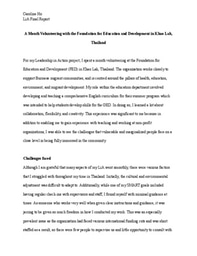What went well?
This week, I travelled to Khao Lak! I arrived on Sunday, and spent Monday and Tuesday working in migrant communities –Ban Nam Kehm and Thap Lamu village– to help Burmese families register students at FED for the upcoming academic year. This was an invaluable and eye-opening experience, as I had the opportunity to see the communities that FED serves, and to hear about the challenges they face firsthand. During the rest of the week, I began teaching English classes to students alongside another intern. Through these experiences, I also learned more about the historical and social context of these communities; most of these migrants were displaced from Myanmar, escaping civil conflict following the 2021 coup. Other families were victims of the 2004 tsunami and earthquake seeking temporary employment elsewhere, whose living situations were further complicated by the political situations in their home country. As a result, they formed their own enclaves where they took on jobs in the fishing or construction industries. The COVID-19 pandemic further complicated their situations, creating multifaceted issues that FED aims to address. An overarching factor that limits the social mobility of Burmese migrants in Thailand is how they face systemic discrimination which places them at a disadvantage in various aspects of their daily lives. For instance, the Thai education system functions to only serve fluent Thai-speakers, which effectively excludes Burmese children from obtaining adequate credentials, limiting their job opportunities. Furthermore, Thailand’s career opportunities are segregated, with Thai-only jobs forcing migrants into fields like construction, fishing, and the service industry. A consequence of this is that as Burmese people are not allowed to be teachers, FED is listed as a “learning centre” rather than a school. Finally, a lack of documentation and the use of a two-passport system contributes to disparities in migrants’ access to services like healthcare, and restricts them from leaving the country.
What could have been done differently?
In beginning to work in a hands-on position, I was able to better gauge which parts of my curriculum had to be changed. I also met the other intern who had been teaching the pre-existing English lessons, and we were able to collaborate to implement the class schedule and discuss possible new learning materials. However, as anticipated, a lot of the curriculum I created had to be cut out or drastically adjusted, which could have been prevented had I been able to get in contact with the other intern prior to my arrival in Khao Lak. Overall, there was a lot of flexibility in how the English lessons were, which was a bit challenging to navigate. I also did not anticipate such a significant cultural difference; my experience in Thailand has led me to feel the most “foreign” I ever had, as I have had very little exposure to the Thai language and culture prior to my trip. Another interesting observation I had was that people are often taken aback upon learning that I am from Canada, and are often very curious about my ethnicity. As I am really only familiar with places where ethnic diversity is very common, this was a very interesting experience, and was something that I had not expected.
What did I learn about myself when working with others?
I have learned that clear communication and planning is essential to my success in contributing to collaborative projects. While some people tend to work well with less of a plan, I have really found that I need to rely on a schedule in order to be productive, as I often get overwhelmed if steps are not clearly outlined.
What did I learn about leadership?
From my experiences this week, I have learned that leadership looks different in different parts of the world, and that communication with and consideration for communities’ needs is a cornerstone of being a good leader. I have often struggled to conceptualize how communities can be provided with assistance or support without infringing or getting overly involved in them in a paternalistic manner. FED does a great job to support Burmese migrant communities as many of their staff are a part of the communities themselves, or have gained significant knowledge about them and earned their trust by building relationships with them over many years. It takes true understanding of communities’ needs to properly allocate resources to support them, which often requires the involvement of community members themselves. For these reasons, and given that I am relatively unfamiliar with the Burmese migrant community in Thailand, I have put a lot of trust in FED to guide my work in hopes that my contributions to these communities are in accordance with their needs.
What do I want to develop or focus on next?
I hope to get more involved with the other sectors at FED. Although I have been working primarily with the Education portion of the organization, I am also intrigued by the migrant development aspect of their work. This sector helps migrants obtain their documentation to give them access to more resources and services, in addition to educating them on their legal rights in areas like employment and health. As all the areas of focus that FED works with intersect, I hope to learn more about the connections between the different parts of the organization.


Please sign in
If you are a registered user on Laidlaw Scholars Network, please sign in